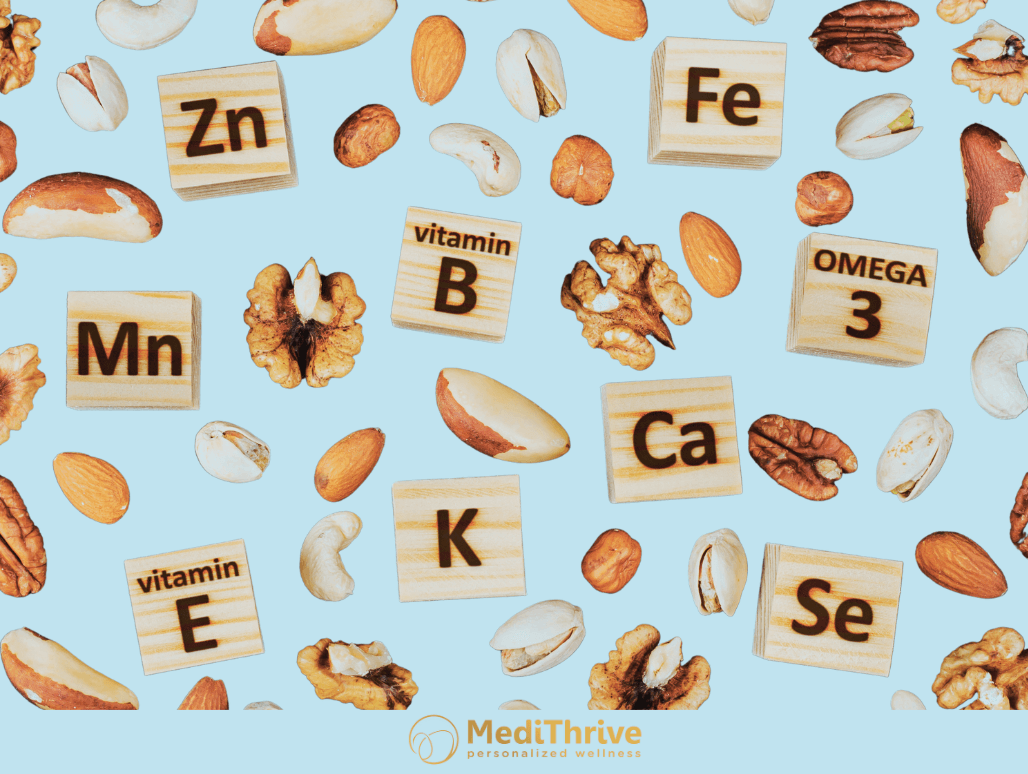When it comes to managing weight, most people think of diet and exercise as the primary factors at play. But there’s a lesser-known player that can have just as much, if not more, influence on your weight—hormones. These chemical messengers, produced by glands throughout your body, control a wide range of physiological processes, including metabolism, hunger, and fat storage. Understanding how hormones impact your weight can give you insight into why you might be struggling with weight gain or weight management, and more importantly, how to address it.
How Hormones Influence Weight
Insulin
The Blood Sugar Regulator (Insulin) is a hormone produced by the pancreas that helps regulate blood sugar levels. When you eat carbohydrates, your body breaks them down into glucose (sugar), which enters your bloodstream. Insulin is then released to help your cells absorb glucose for energy or storage.
However, if you consistently eat too many refined carbs or sugary foods, your body may become resistant to insulin. This means that insulin must work harder to do its job, and over time, the excess glucose is stored as fat, leading to weight gain. Insulin resistance is also closely linked to metabolic disorders like type 2 diabetes.
What to do about it: Focus on a balanced diet with a low glycemic index (GI), which helps prevent insulin spikes. This means choosing complex carbohydrates like whole grains, vegetables, and legumes over refined sugars and processed foods. Regular exercise can also help increase your body’s sensitivity to insulin, making it more effective at controlling blood sugar and fat storage, which are important factors in natural weight loss strategies.
Cortisol
The hormone Cortisol is often called the “stress hormone” because it is released during times of stress. It plays a vital role in your body’s fight-or-flight response, but chronic stress can lead to consistently elevated cortisol levels. High cortisol levels are linked to increased appetite, especially for high-fat, sugary foods, and the accumulation of visceral fat—fat stored around your organs, which is especially harmful to your health.
What to do about it: Managing stress is key. Techniques like mindfulness, meditation, deep breathing exercises, yoga, regular physical activity, and certain dietary supplements can help lower cortisol levels. Ensuring you get enough sleep is also crucial, as poor sleep can further elevate cortisol and contribute to weight gain. Incorporating stress management into your routine is a powerful way to support weight management and overall well-being.
Leptin and Ghrelin
The Hunger Hormones (Leptin and Ghrelin) are two hormones that regulate hunger and appetite. Leptin is produced by fat cells and signals to your brain when you’re full, helping to prevent overeating. Ghrelin, on the other hand, is produced in the stomach and signals hunger, stimulating appetite.
Disruptions in the balance of these hormones can lead to overeating or difficulty feeling full. For example, when you don’t get enough sleep, ghrelin levels increase, making you feel hungrier, while leptin levels decrease, reducing your ability to feel satisfied after eating. Similarly, chronic stress can also alter the balance of leptin and ghrelin, making you more prone to cravings and overeating.
What to do about it: Prioritize sleep, aiming for 7-9 hours a night. This helps regulate the balance of leptin and ghrelin. Eating smaller, more frequent meals can also help maintain stable levels of these hormones. Additionally, focusing on a nutrient-dense diet with plenty of protein and fiber will help keep you feeling fuller for longer, which is key for effective natural weight loss strategies.
In addition to natural weight loss strategies, GLP-1 medications are becoming an increasingly popular tool for managing weight gain and promoting weight loss in individuals struggling with obesity or metabolic disorders. GLP-1 (glucagon-like peptide-1) is a hormone naturally produced in the intestines that helps regulate insulin secretion, suppress appetite, and slow gastric emptying. Medications that mimic the action of GLP-1 have been shown to help with weight loss by reducing hunger and improving blood sugar control.
Thyroid Hormones
The thyroid gland produces hormones that regulate metabolism, the process by which your body converts food into energy. An underactive thyroid (hypothyroidism) can lead to weight gain, fatigue, and difficulty losing weight. On the other hand, an overactive thyroid (hyperthyroidism) can lead to weight loss, increased appetite, and anxiety.
Thyroid imbalances can be caused by autoimmune diseases, nutritional deficiencies, or other factors. If your thyroid hormone levels are off, it can make weight management much more challenging.
What to do about it: If you suspect thyroid issues, it’s important to consult a healthcare provider. Blood tests can check your thyroid hormone levels, and treatment may involve hormone replacement therapy or dietary changes, such as increasing iodine intake or consuming more selenium-rich foods. A well-balanced diet and regular exercise can also help optimize thyroid function, which is essential for maintaining a healthy metabolism and avoiding weight gain.
Estrogen and Progesterone
The Reproductive Hormones (Estrogen and Progesterone) are the key hormones involved in regulating your menstrual cycle, but they also have significant effects on weight. For women, fluctuations in these hormones, especially during puberty, pregnancy, and menopause, can lead to changes in fat distribution and body composition.
During perimenopause and menopause, estrogen levels drop, which can lead to weight gain, particularly around the abdomen. Estrogen is thought to play a role in fat storage, and when its levels decrease, fat may accumulate more easily, especially in the abdominal area.
What to do about it: To manage hormone-related weight gain, focus on maintaining a balanced diet and engaging in regular physical activity, including strength training. Some women find that hormone replacement therapy (HRT) helps balance estrogen levels and mitigate weight gain during menopause, though it’s important to discuss this option with your doctor. Additionally, managing stress and getting enough sleep are crucial for overall hormonal balance.
Testosterone
The Hormone of Muscle Mass (Testosterone) is often thought of as a male hormone, but both men and women produce it. It plays a key role in muscle mass, fat distribution, and metabolic rate. Low testosterone levels can result in a decrease in muscle mass and an increase in body fat, particularly around the abdomen.
As men age, testosterone levels naturally decline, which is often associated with increased body fat. In women, a decline in testosterone during menopause can lead to similar issues.
What to do about it: Strength training exercises, which help build muscle, can help maintain healthy testosterone levels. Ensuring adequate protein intake, managing stress, and prioritizing sleep can also support optimal testosterone levels. In some cases, testosterone replacement therapy may be considered for those with significantly low levels of testosterone, but this should always be discussed with a healthcare provider.
What You Can Do to Address Hormonal Imbalances
Consider Hormonal Treatments
In some cases, hormone replacement therapy (HRT) or other treatments may be appropriate. However, these options should only be considered after discussing the potential risks and benefits with your healthcare provider. It’s essential to have a clear plan and understanding before pursuing hormonal treatments.
Prioritize Diet and Exercise
A balanced diet rich in whole foods, lean proteins, healthy fats, and plenty of vegetables is essential for maintaining hormonal balance. Regular exercise, particularly strength training and cardiovascular exercise, helps regulate insulin, cortisol, thyroid function, and hormone levels related to hunger and metabolism. This is one of the most effective natural weight loss strategies.
Manage Stress
Chronic stress can wreak havoc on your hormones, particularly cortisol. Find ways to manage stress through relaxation techniques, such as meditation, yoga, or even simple hobbies that you enjoy. Additionally, regular physical activity can help reduce stress and promote hormonal balance, helping you stay on track with your weight management goals.
Get Enough Sleep
Sleep is one of the most important factors in regulating hormones. Aim for 7-9 hours of quality sleep per night to help regulate leptin, ghrelin, cortisol, and other hormones that influence weight. Sleep helps optimize metabolism and can make a significant difference in managing your weight.
Final Thoughts
Hormones play a crucial role in weight management, and understanding how they impact your body can provide valuable insight into why you’re gaining weight, struggling to lose it, or facing other challenges related to your weight. While you may not have complete control over every hormonal fluctuation, adopting a healthy lifestyle focused on balanced nutrition, regular exercise, stress management, and quality sleep can go a long way in supporting hormonal health and achieving your weight loss goals.
By paying attention to your body’s hormonal signals and working with our healthcare team, you can better manage your weight and feel more empowered in your health journey. Whether you’re dealing with hormonal imbalances, weight gain, or looking for natural weight loss strategies, understanding the connection between hormones and weight is key to taking control of your health.
If you’re considering hormone replacement therapy or looking for the right weight loss solution for you, consult with our knowledgeable healthcare team. Join us at MediThrive Personalized Wellness to embark on a journey to vibrant health. Together, let’s unlock the secrets to your health and reclaim your vitality. Call (980) 580-6070 to learn more about our personalized approach and tailored wellness solutions or request a consultation today. It’s your time to thrive!







